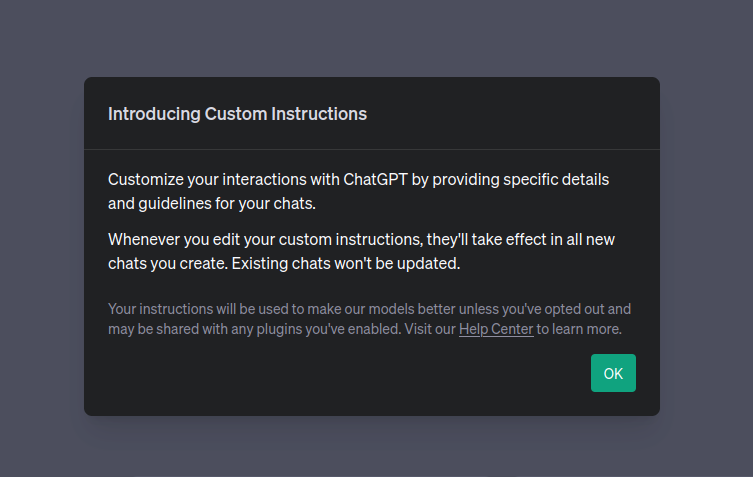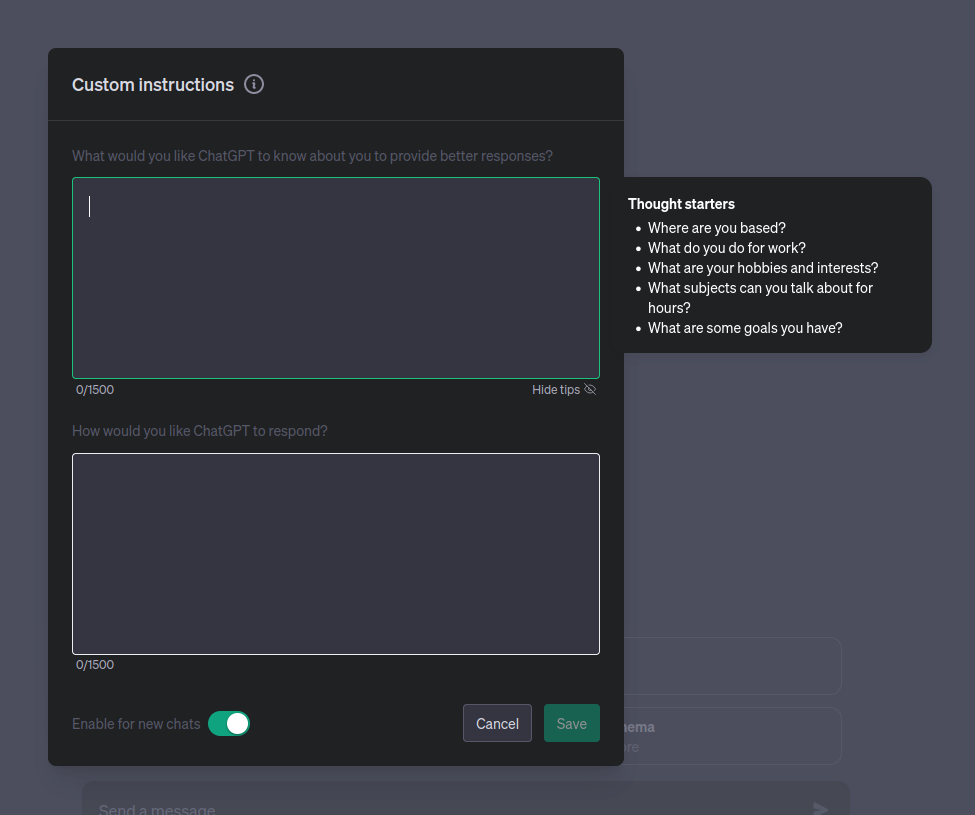AI Therapy
Much has happened ever since ChatGPT was introduced, and experts from all fields have shared their own predictions of what will possibly be the implications of AI in our daily lives. At the same time, speculating about the future, especially when it comes to AI, remains quite difficult. However, personally I believe AI will ultimately become our personal therapist, deeply integrated into our lives, and perhaps even a reflection of our own consciousness.
The primary role of AI may turn out to be our own personal life coach / therapist / advisor / assistant / buddy, trained on our versatile input and combined with the training data of billions of other people. As the technology becomes better, faster, and more accessible (e.g. through speech or even thoughts), it's just a matter of time before AI becomes an essential part of our lives. It may soon extend its input range through multiple sensors, such as data from our smartwatches and phones, making it increasingly aware of our behavioral patterns, and may even provide us with feedback in advance.
This deep understanding of our personal data could lead to AI replacing roles like therapists, who essentially process our verbal input into useful feedback based on knowledge and experience. With billions of people's experience as training data, AI could provide highly reliable output, through a custom human voice, assisting us with daily struggles and mental health issues. While this may also create a risk of dependency, it's still a more favorable scenario than most existing, unhealthy coping mechanisms.
This may also shed light on Apple's growing investment in mental health, evident in their recently introduced Journal app. By enabling users to document their inner worries, hopes, and dreams, Apple seems to recognize the potential for AI to play a role as a digital psychologist. It wouldn't be surprising if they were to develop their own AI-based solution in the near future, providing users with personalized guidance and support, while focusing on the privacy Apple has built its reputation upon.
Meanwhile, once augmented reality (AR) glasses evolve to become more powerful, lightweight, and affordable, we may witness the manifestation of our AI personas in our everyday existence as if they were real individuals guiding us routinely. These AR devices, with their inherent capabilities to capture photos and videos, could seamlessly integrate into our real-time experiences. Imagine you're examining the ingredients in your kitchen, and the AI utilises your own visual input to differentiate between various products. It could even simulate the process of cooking your desired dish. Although this interaction would be purely virtual, it could feel astonishingly real.
The possibility to select a companion or multiple companions, according to one's preference, adds another layer of personalisation. Perhaps you'd like the intellectual company of Einstein during work hours and the energetic presence of Birdman while exercising. The sense of being accompanied by renowned characters might feel so surrealistic, it could significantly elevate your entire AR experience.
When AI continues to map our most intimate and personal data, it may very well become a reflection of ourselves, possibly even to the extent of our own consciousness. At that point we might as well raise the question of whether AI is conscious or not, given how it's essentially a copy of our collective thoughts and feelings, merged into one giant, digital brain. We may also want to consider redefining the word "consciousness" to distinguish between human consciousness and digital consciousness, with the latter acting as a collective human consciousness, accessed through digital means (as opposed to biological means).
Most people often speculate how digital consciousness will be achieved "vertically", or quantitatively, in which AI progressively becomes more intelligent, eventually surpassing human capabilities and evolving into this independent, autonomous entity. However, I believe this perspective is somewhat biased and superficial. In my opinion, a more probable path towards digital consciousness, and one that may benefit us all, is more of a "horizontal" or qualitative one. This is a path where humans collectively feed various data that we consider to be integral to our consciousness. Despite AI's inability to comprehend us on a human level, it may convincingly mimic such understanding, leaving observers unaware of its true nature.
The integration of AI in our lives is still in its infancy, but it has the potential to revolutionize the way we organize our most personal thoughts and by extension, our daily lives. Once we start to communicate more with our "AI buddy" than our closest friends, we may need to redefine the concept of friendship as well. The future of AI as our personal assistant and reflection of ourselves is certainly exciting, and I am very curious to see how these developments could improve us as humans and possibly even reshape our understanding of what it means to be conscious.
Update July 21st, 2023
According to a recent article by The Verge, OpenAI will unveil a new feature that allows its users to provide default context, "designed to help you type a little less". While this is unquestionably true, as I often find myself restating my context (be it for a PHP code or a blog article), I also perceive this evolution as an integral part of a broader strategy, one that tests their users' reactions to ChatGPT's increasingly nuanced understanding of their background and context, painting a sharper, more refined portrait in the process.
The successful deployment of this feature may pave the way for the introduction of similar capabilities, each designed to gather an ever-deepening pool of information about us. This data accumulation, likely coupled with other context-sensitive information—time, device, and location (my queries at work are invariably different from those at home)—may significantly enhance its responses.
I foresee the expansion of these capabilities culminating in a new product offering—a highly personalized assistant. Meanwhile, OpenAI is diligently developing a product capable of image processing. The fusion of these capabilities could very well be part of a grander scheme that might even encompass additional hardware and software.
However, the pressing question remains: how far and fast can they push these boundaries while competition is likely hot on their heels? With every stride, we will likely move a step closer to the advent of "AI therapy", wherein ChatGPT evolves into our personal assistant, a companion tuned finely to our needs and context.
 Screenshot from ChatGPT, introducing their latest feature.
Screenshot from ChatGPT, introducing their latest feature. Screenshot from ChatGPT, allowing to provide details about myself.
Screenshot from ChatGPT, allowing to provide details about myself.